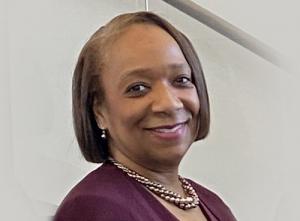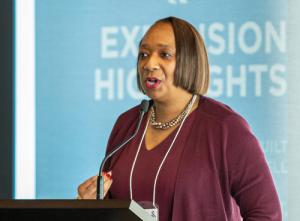Utilities Workforce and Spend
Crystal Ross-Smith is Director, Diversity and Inclusion, at Ameren.
PUF spoke with leaders from AABE, Ameren, Evergy, Exelon, Southern Company, and Burns & McDonnell about diversity spend and diversity in the workplace, what they are doing to promote inclusion, and why it is crucial to the success of their companies. Read on to learn more about these fascinating issues, the challenges, and where they see their initiatives going in the future.

PUF's Joseph Paparello: You're the Director of Diversity and Inclusion at Ameren. Talk about your daily role.
Crystal Ross-Smith: My day to day role is working with my team to create strategy to make sure that everyone in Ameren, our contractors, and people in our community that we impact, get the message about diversity and inclusion.
We focus on what it means, what we're doing to make sure that we have an inclusive workforce, and anyone doing business with us or anyone interacting with us also has that understanding and same mission.
PUF: What is Ameren doing surrounding diversity and inclusion? What are some initiatives?
 Crystal Ross-Smith: We say, this is what diversity is, this is what diversity is not, to give them that roadmap because people were saying, I want to support diversity and I want to support inclusion, but I don’t know how to do that.
Crystal Ross-Smith: We say, this is what diversity is, this is what diversity is not, to give them that roadmap because people were saying, I want to support diversity and I want to support inclusion, but I don’t know how to do that.
Crystal Ross-Smith: We have training programs that we offer to our coworkers here at Ameren. We share, what is diversity, what is inclusion? What does that mean for diversity and inclusion at Ameren? What do we want you to do? We provide dos and don'ts.
We say, this is what diversity is, this is what diversity is not, to give them that roadmap because people were saying, I want to support diversity and I want to support inclusion, but I don't know how to do that. I want to make sure I'm not making any missteps. We want to give them that comfort level to let them know what is, and what is not, diversity and inclusion.
That's one of the things we do. We produce and record videos that we share with our coworkers talking about different topics. Right now, for 2020, we're working on the courage to live your values and we're interviewing women in the workplace. What does that mean for you and how are you impacted by this?
For the next video series, we have our foreign-born coworkers, asking, what does that mean for you and how are you impacted in the workplace and in your interactions with others in the community? That's especially important because, as part of their roles, our coworkers may go out and interact with customers.
The third video focal point for 2020 is people with disabilities. What does this mean for you in the workplace and how can we support you to make sure you are able to bring your whole selves to work?
That's across the board for all three of those categories. We launched a Diversity and Inclusion Leadership Academy. We launched a couple of years ago where we're training our coworkers to be subject matter experts when it comes to diversity and inclusion.
We're pleased that this year we've launched a segment for our leadership team. We had it across the board, but now we've narrowed in and focused on our leadership team because they are the decision makers, the people leaders. They have the most impact on our coworkers here at Ameren. We want to make sure they understand what it means to be inclusive and to make sure that they're living and acting those values in the workplace.
Another important aspect we're working on this year is we're starting to focus on equity. I mentioned at Burns & McDonnell last week that we're not perfect, but we're understanding and living diversity. We're understanding and living inclusion.
Now we're looking at equity. What do we need to do to make sure everyone is successful at Ameren? We understand that doesn't mean everybody gets the same thing. It means you get what you need to be successful and then the next person gets what's needed to be successful and so on. Those things may not be the same, but it is what you need to be successful.
PUF: Do you have a method by which you're evaluating how successful your diversity inclusion programs have been?
Crystal Ross-Smith: Yes, we do. Probably for everyone in the business, whatever we do, we evaluate it immediately after it's done and ask those people who are participating to provide us their input and evaluation.
Right after you attend an event that we sponsor or you attend one of our sessions or one of our trainings, we ask you to provide feedback. We make sure that what we're trying to deliver, you are receiving, and if there's something additional that you're looking for, then we make some adjustments and provide that information.
Then we look at our employee engagement. Everybody has some kind of employee engagement surveys. We try to see, when we implemented these programs in 2018 and again in 2019, if engagement went up or down.
We're seeing a steady increase when it comes to engagement. I should be more specific, because the engagement surveys are not just about diversity and inclusion, they're about how employees feel overall.
But of course, every survey has questions geared at determining whether or not coworkers feel included and valued in the workplace. We attribute a lot of that to our diversity and inclusion programs.
PUF: How do you attract diverse talent to Ameren and how do you retain that talent?
Crystal Ross-Smith: I don't want to say, just like everybody else, because we're doing a great job, but we have room for improvement. We could do better. We network with organizations that have diverse populations.
We'll participate with NSBE, the National Society of Black Engineers, AABE, the American Association of Blacks in Energy, WIT, Women in Technology, and SASA, the Society of Asian Scientists and Engineers, among many other like organizations. We do that across the spectrum when it comes to different races and cultures, and we interact and try to attract diverse talent.
We do a lot of coworker referrals and we have professional resources that we reach out to when we're trying to hire, for example, our executive leaders. If we have any kind of transitions or retirements, promotions, we reach out to seek diverse talent to make sure that we have them as part of the pool of candidates.
That's so we can have diverse talent. But we've also discovered, and this is through feedback, is people look at our website. When they look at our website, they want to see people that look like them in positions they aspire to be in.
If you look at our website and there were no minorities or women on our executive leadership team, candidates will go elsewhere. We make sure that we share with our potential candidates, this is what our demographic looks like, what our leadership looks like, so there's room at the top for everyone.
PUF: For your diverse leadership, do those individuals tend to come from in-house or do you have to sometimes look elsewhere to bring in more senior level people?
Crystal Ross-Smith: It varies. We have promoted from within. We've also hired from external resources. We're looking for the best of the best and if that means it's an external candidate, who's the better qualified candidate for the position we're trying to fill, then that's who we go with.
I'm thinking of two leaders we've brought in within the last three years. They're both minority females on our executive leadership team and they were external candidates, and they are amazing leaders.
PUF: What advice would you give to diverse workers that might be considering a career in this industry?
Crystal Ross-Smith: I share with everybody that I interact with. It's a great industry to be in. There are a growing number of women and minorities, and there's a lot of potential. Energy companies are everywhere.
In my time here, I've held so many positions with several different focuses, and I haven't left the company. I felt like I've had about fourteen different jobs over my time here. I've been in the customer experience side of it, and the operations side of it.
I've worked government relations, legislative affairs, marketing, public affairs, materials management, and I'm now in diversity and inclusion. I've had all of those experiences within the same corporation.
It has been a great opportunity. I've learned so much. I've stepped out of my comfort zone several times and the company has afforded me that opportunity. It's a great industry to be in.
PUF: Utilities are focused on diversity spend with contractors, subcontractors, and organizations with whom you do business. Is that an area of focus for Ameren?
Crystal Ross-Smith: Yes, it is. We've had our supplier diversity program for several years. It's been going over a decade now and we are doing well. I am not in supplier diversity, as that's a different group.
I look at their results, what they're putting out with their strategy, and how they go about it. Every year they exceed their goals exponentially. I don't want to throw out any false numbers, but if they have a goal to spend X number of dollars, they are well exceeding that goal.
PUF: Where do you see diversity heading in the next few years? Is it going to be ingrained in how utilities operate their businesses, or is there still a lot of work to do?
Crystal Ross-Smith: I see it as both. There's still a lot of work to do, but it's something that can be done. You have to be intentional about your hiring practices and staying strong because everybody does not, and when I say everybody, our external entities may not understand why we're doing what we're doing, but we have to be courageous enough to continue doing the right thing.
The business case for diversity and inclusion is there. When you have a diverse group of people, you have a diverse mindset, and innovative thinkers, and somebody who will bring something to the table that you may not have thought of.
All of that is helping us become a better and stronger company. The business case is there. I know we are going to continue along this path and peer companies that I speak to also plan to continue along this path.
The results are showing that by being diverse and inclusive, we're doing well. We're going to keep going that route. It's not going to be easy, but it's part of how we do business now.
Diversity in Utilities Workforce and Spend conversations:


